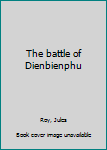The battle of Dienbienphu
Select Format
Select Condition 
Book Overview
Forty years ago, France's war with the anticolonial Communist-led Vietminh insurgency climaxed in the bloody battle for the valley of Dienbienphu. The Vietminh's victory put the 17 million people of... This description may be from another edition of this product.
Format:Mass Market Paperback
Language:English
ISBN:B0007EXYUW
Release Date:January 1966
Publisher:Pyramid Books
Length:413 Pages
Weight:0.40 lbs.
Customer Reviews
4 ratings
Good / Educational
Published by Thriftbooks.com User , 14 years ago
Ever wondered how could the Vietnamese defeat the French and then the USA in order to gain their independence? this is a good book to examine the reasons. I guess that at the end it can all be summarized into this: they were fighthing for a cause they considered worth dying for (and dying they did by the thousands). What I liked about this book is the objectivity of its author (a French), and the fact that it's focus on the human element of the battle. I would have been nice if the book had had more maps. Overall a very educational book.
Can one live long enough that the reading of two books on the same battle is merited?
Published by Thriftbooks.com User , 15 years ago
Fortunately the answer is "Yes!" Though there were various moments that I had my doubts. I was once in a similar situation, despite the admonitions encompassed in a famous Chinese military principle; that one should "...never fight on a battlefield that resembles an inverted turtle..." (p 364); principles that I'm sure my commanders were totally unaware of. The message was metaphorically the same, but not as literal-- the 122mm rockets that destroyed the metal runway at Polei Klang did not leave the message written by the Vietminh commandos who destroyed the runway at Dien Bien Phu, written in French and German: "Dien Bien Phu will be your grave."(p 205) For the English-speaking world the classic account of the battle is "Hell in a Very Small Place," written by another Frenchman who subsequently became an American citizen, and was to die in Vietnam covering the American war, in 1967. Bernard Fall's account is excellent, so too is Roy's, whose erudition may exceed Fall's, placing the battle in a better historical context. Roy's account transcends Fall's strictly military and political account, and includes painful dollops of moral observations. Jules Roy led a remarkable life, which is passionately described in his autobiography, "Memoires barbares." He was born a "pied-noir," an Algerian of French extraction, in Mitidja, in 1907, and was a friend of his fellow pied-noir, Albert Camus. In his autobiography, he describes his transition from Petainist to DeGaullist in the Second War World, joining the RAF as a bombardier, surviving one of the most dangerous jobs of the war, and writing an account "La Vallee heureuse" a sardonically named account of the bombing raids over Germany, including the fire-bombing of Dresden. The awakened moral sense displayed in this book carries over into his account of the battle at Dien Bien Phu. He quotes the American journalist, David Schoenbrun, who "...denounced the original sin of the colonial era: the absolute rights of France, forgetting the lesson of its Revolution, recognized Vietnamese liberty only in terms of their own interests." (p 27). More damning are Roy's own words: "...that the imperialism the most detestable in the world, which disguises its refusal to loose its markets and dividends as a crusade against communism." (p 353). As with Fall's account, the book is essentially a detailed military history of the battle, with the particulars of the movements of the tactical units, as well as the thoughts of the battle's "big men," primarily those on the French side, de Castries, Navarre, and Cogny. As with similar debacles, hubris played a major part - the French commanders knew the Vietminh could not possible have the artillery to defeat a modern Western army - and like most debacles, there was a distinct lack of willingness to accept responsibility, which may sound a lot like the recent one on Wall Street: "... victory has a 100 fathers, and defeat is an orphan." Roy's account of Graham Greene's
The characters and the experience
Published by Thriftbooks.com User , 18 years ago
If you want to know what actually happened and why and how at Dien Bien Phu, then the definitive text is Windrow's The Last Valley. Read this work - actually by Jules Roy - for more insight into the personalities on the French side, and how they reacted as the pressure and the stress increased.
Interesting account of the battle
Published by Thriftbooks.com User , 21 years ago
Only having limited exposure to the battle of Dien Bien Phu, I looked forward to learning about this decisive battle. Mr. Roy has written a saddening, gripping account of sufferings and heroism displayed by the French troops. Of course, I wish he had given more time to the VienMihn, but since he is French... he had to place more emphasis on the French experience. Without doubt, this book is not for arm-chair generals who wish to learn about battles to debate with others. This book is for those who wish to learn everything about the war: Horrors, deaths, sadness, defeat, struggles, honor, disgrace.






